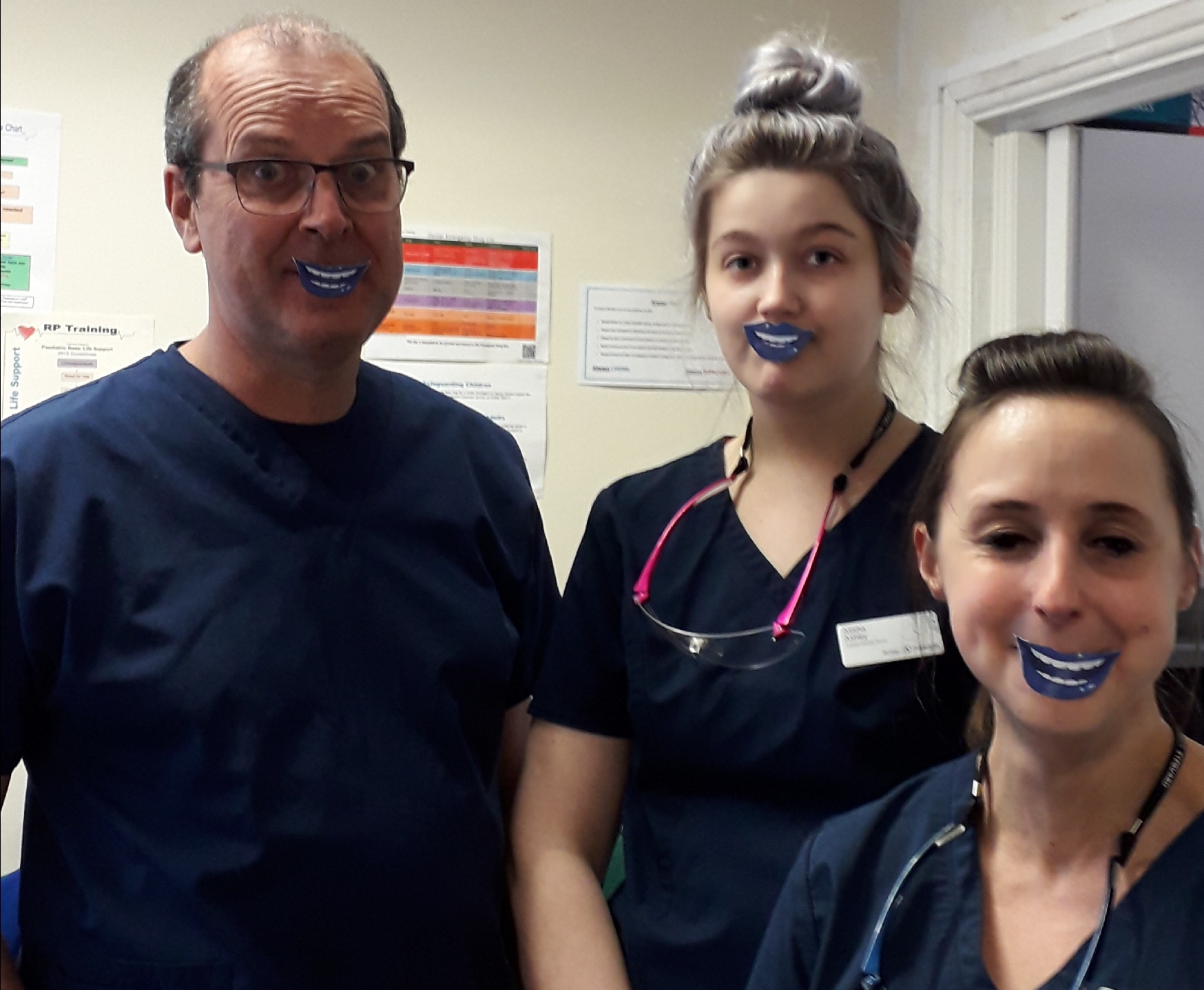Mouth Cancer Awareness Month 2018
Blue Smiles all Round......... Raising Awareness

Most people have heard of cancer affecting parts of the body such as the lungs or breasts. However, cancer can also occur in the mouth, where the disease can affect the lips, tongue, cheeks and throat.
Anyone can be affected by mouth cancer, whether they have their own teeth or not. Mouth cancers are more common in people over 40, particularly men. However, research has shown that mouth cancer is becoming more common in younger patients and in women. In the last year more than 7,000 have been diagnosed with mouth cancer in the UK – an increase of more than a third compared to a decade ago
Common symptoms of mouth cancer
- A sore or ulcer in the mouth that persists more than three weeks.
- A white or red patch on the gums, tongue, or lining of the mouth.
- A lump anywhere in the mouth.
- Swelling of the jaw that causes dentures to fit poorly or become uncomfortable.
- Difficulty in chewing or moving the jaw or tongue.
- Numbness of the tongue or mouth.
- A feeling that something is caught in the throat.
- Difficulty in swallowing.
- A chronic sore throat or voice change (hoarseness) that persists more than six weeks.
- Neck swelling present that persists more than three weeks.
- Unexplained tooth mobility persisting for more than three weeks
- Persistent nasal obstruction/mucus causing difficulty breathing through nose.
- Unexplained earache.
Visit your dentist or doctor at once if you notice any abnormal problems or are not sure.
Remember your dentists routinely does soft tissue checks …Mouth Cancer screening is routinely provided for you at your dental examination appointment. Just another reason, why regular check-ups with your dentists is very important for your overall health.
Risk Factors
The most important aetiological factors are tobacco usage and excess consumption of alcohol, and these factors together are thought to account for about 75% of oral cancer cases in Europe.
Tobacco
At least 75% of patients diagnosed with oral cavity and oropharyngeal cancers are tobacco users. Smokers have 6-times greater risk, and those using chewing tobacco or chewing paan/gutkha also have increased risk levels.
Alcohol
In the UK, 6% of cancer deaths are caused by alcohol.5 Heavy drinkers have a 5-10 times greater risk of developing cancer but even small amounts of alcohol (as little as 1 unit a day) can increase the risk.6 Individuals who use tobacco and alcohol face a 30-times greater risk than abstainers.
Human Papilloma Virus (HPV)
Most HPV infections go away on their own without causing any type of abnormality but persistent infection with certain types of the Human Papilloma virus (HPV), a group of viruses, is now recognized as the major cause of cervical cancer. Having many sexual partners is a risk factor for HPV infection. Evidence is emerging that HPV is linked to some mouth cancers. Studies have shown that oral HPV infection is a strong risk factor for oropharyngeal cancer (cancer that forms in the middle part of the throat and includes the soft palate, the base of the tongue, and the tonsils).
Dr Vinod K Joshi, Founder of the Mouth Cancer Foundation, states:
“A high proportion of oropharyngeal cancers in nonsmokers and younger adults have been associated with HPV. The mode of transmission may be frequent oral sex in adolescents and young adults”.
Key Statistics about Mouth Cancer in UK:
- Mouth cancer is one of the top ten most commonly diagnosed cancers and accounts for more than 7,800 new cases each year.
- Incidence has risen by 25% over the past 10 years.
- 5-year survival rate has hardly improved, 50%overall for the last few decades.
- Mouth cancer is more common in men than women. However, the sex ratio in the UK has decreased rapidly from around 5:1 fifty years ago to less than 2:1 today.
For more information about mouth cancer , please vist the Oral Health Foundation
